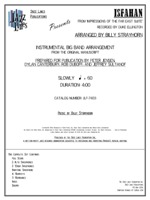ISFAHAN (FROM THE FAR EAST SUITE)
Recorded by the Duke Ellington Orchestra
Composed and Arranged by Billy Strayhorn, Prepared by Rob DuBoff and Jeffrey Sultanof

Cat #: JLP-7403
$50.00This item usually ships within 1 business day.
Questions?
Please call +1-518-587-1102 or email us.
Edition: Jazz Big Band Arrangement
Description: Ballad - Medium
Publisher: Jazz Lines Publications
This arrangement, first known as Elf, was originally written sometime in 1963. It was first recorded in New York on July 18, 1963. The title had been changed to Isfahan sometime before the Duke Ellington band’s performance on the English television program Jazz 625 on February 20, 1964. While on tour in Europe during that year Ellington introduced several pieces as Impressions of the Far East. At that time the Suite consisted of Amad, Agra, Bluebird of Delhi, and Depk. Agra and Bluebird of Delhi written by Strayhorn and Amad and Depk were written by Ellington. As the notion for a full-length suite began to take shape several more pieces were composed: Ad Lib on Nippon and A Tourist Point of View, both composed by Ellington, and Mount Harissa and Blue Pepper, possibly composed by both Ellington and Strayhorn (scores have not been located for these two movements; hence, authorship is in question). Isfahan was recorded on December 20, 1966 to be included in the Far East Suite.
This is an alto saxophone feature, written to showcase Johnny Hodges. The alto saxophone part is as-written by Billy Strayhorn. We encourage the soloist to interpret the music as he/she sees fit, rather than mimic Hodges. As such we have resisted the temptation of including a transcription of Hodges’s performance. While we feel solo transcriptions are important for educational purposes, playing them within the context of a performance of this work may not be desireable. A piano part has not been included; however, chord changes have been indicated in the bass part.
This tune wound up becoming a standard, having been recorded more than 200 times. The Ellington band, however, never revisited the arrangement after the 1966 recording.
2 Alto Saxophones
2 Tenor Saxophones
Baritone Saxophone
4 Trumpets
3 Trombones
Bass
Drums






